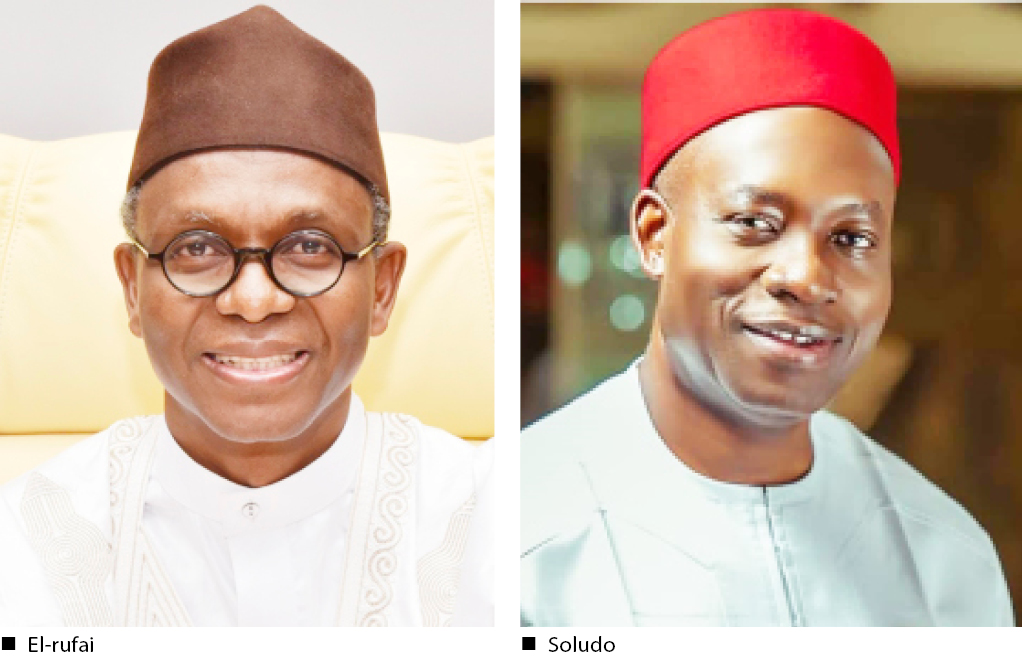Revenue sharing formula: El-Rufai wants 80% for states, revert to 1963 constitution
Kaduna State governor, Malam Nasir El-Rufai, has advocated a restructuring of the sharing formula of Nigeria’s revenue in favour of states. He said if the revenue sharing is reversed to 20 per cent for the federal government and 80 per cent for states, the federal government will then relinquish most of its current responsibilities to […]

El-Rufa’i and Soludo
Kaduna State governor, Malam Nasir El-Rufai, has advocated a restructuring of the sharing formula of Nigeria’s revenue in favour of states.
He said if the revenue sharing is reversed to 20 per cent for the federal government and 80 per cent for states, the federal government will then relinquish most of its current responsibilities to the states.
El-Rufai, who spoke at the policy and book presentation in Abuja on Tuesday by Dr. Zainab Usman, Director of the Carnegie Africa Programme, said the new formula will be the only way citizens can hold governors to account.
Daily Trust reports that the restructuring committee of the All Progressives Congress (APC) chaired by El-Rufai, came up with a number of recommendations aimed at engendering true federalism in the country.
- Aisha Buhari inaugurates African First Ladies Peace Mission headquarters
- Re: Super Eagles, other national teams need overhaul
The APC had listed restructuring as part of its campaign promises to Nigerians prior to the 2015 elections, which brought the party to power.
The committee recommended, among other things, that power be devolved to states on issues such as policing and resource control.
However, a few weeks before the end of the APC-led government, the party has yet to implement the recommendations made by the El-Rufai committee.
The governor said the theme of the event, which was on how Nigeria can build a post-oil economic future, was crucial, noting that if the country doesn’t end fuel subsidy now, the economy might go bankrupt sooner than expected.
“If we reverse the revenue allocation and the federal government has only 20 per cent, and 80 per cent goes to the states, then you go to the exclusive list and revert to the 1963 Constitution where the FG had limited functions and most of the functions went to the states.
“If your general hospitals don’t work, if your primary schools don’t work, if your secondary schools don’t work, and so on. You ask your governor. Then things will begin to change. The states will have enough resources to compete, just like in the days of regional governments,” he said.
Also speaking, a former Central Bank governor, Prof. Charles Soludo, called for devolution of powers, saying Nigeria is the only country in the world with three federating units.
Soludo, who is the Anambra State governor, stressed the need for the country to have what he called “real fiscal federalism”.
“The FG, states and the local governments are an anomaly, and it is time to face real fiscal federalism. The federal government is now an octopus with huge costs. The FG has close to 1000 MDAs and attempts to run the entire country from Abuja. This is wrong in a federal structure. We will have to take deliberate steps to incentivise the growth of institutions from below,” he said.
Earlier in her remarks, the author of the book, Zainab, noted that sub nationals needed to do more in terms of revenue generation as only four states in Nigeria can survive without allocations from the federal government.
Many CEOs earn more than Nigeria’s president – RMAFC
In another development, the chairman of the Revenue Mobilisation Allocation and Fiscal Commission, Mohammed Shehu, while speaking at the 1st Economic Confidential Public Lecture and Book Presentation held yesterday in Abuja, said there was a need to pass the new revenue allocation formula as the current one has given room for some chief executive officers of agencies to earn more than the president.
At the event, two books were unveiled as part of the theme of the programme which was ‘Economic diversification in an evolving cashless society’.
The books unveiled are ‘Pantami: Trials and Triumph of a Digital Maestro’ and ‘eNaira Revolution: A Peep into Nigeria’s Cashless Future,’ authored by Yushau A. Shuaib and Abdulrahman Abdulraheem.
Speaking at the event, Shehu said unless the proposed review of the remuneration act for elected and designated public officials is passed into law in the remaining days of the current administration, the total package of the President-elect, Senator Bola Ahmed Tinubu, would remain N1.2m a month.
Similarly, he disclosed that the state governors’ monthly take-home pay is N1.1m, noting that some heads of government agencies earn a better monthly salary than Nigeria’s president and state governors.
“The salary of Mr President is N1.2m a month. I’m sure some MDAs heads earn N5m and some N2m a month. No public servant in Nigeria should earn more than Mr President and the governor of a state,” he said.
He recalled that the last time a salary review of political office holders and other designated public and judicial office holders was carried out was in 2008, noting that the exercise was overdue for review.
In his remarks, the keynote speaker, the Minister of Communication and Digital Economy, Professor Isa Ali Pantami, said the issue of economic diversification cannot be overemphasised.
He said what Nigeria requires is the deployment of technology tools to achieve diversification.
